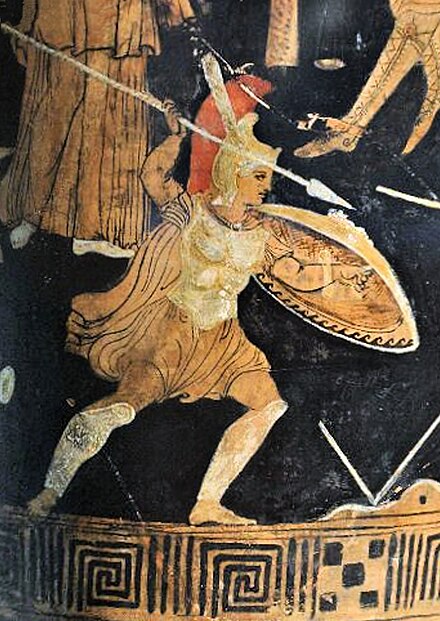Hero
A hero (heroine in its feminine form) is a real person or a main fictional character who, in the face of danger, combats adversity through feats of ingenuity, courage, or strength. Like other formerly solely gender-specific terms (like actor), hero is often used to refer to any gender, though heroine only refers to women. The original hero type of classical epics did such things for the sake of glory and honor. Post-classical and modern heroes, on the other hand, perform great deeds or selfless acts for the common good instead of the classical goal of wealth, pride, and fame. The antonym of hero is villain.[1] Other terms associated with the concept of hero may include good guy or white hat.
In classical literature, the hero is the main or revered character in heroic epic poetry celebrated through ancient legends of a people, often striving for military conquest and living by a continually flawed personal honor code.[2] The definition of a hero has changed throughout time. Merriam Webster dictionary defines a hero as "a person who is admired for great or brave acts or fine qualities".[3] Examples of heroes range from mythological figures, such as Gilgamesh, Achilles and Iphigenia, to historical and modern figures, such as Joan of Arc, Giuseppe Garibaldi, Sophie Scholl, Alvin York, Audie Murphy, and Chuck Yeager, and fictional "superheroes", including Superman, Spider-Man, Batman, and Captain America.
The word hero comes from the Greek ἥρως (hērōs), "hero" (literally "protector" or "defender"),[4] particularly one such as Heracles with divine ancestry or later given divine honors.[5] Before the decipherment of Linear B the original form of the word was assumed to be *ἥρωϝ-, hērōw-, but the Mycenaean compound ti-ri-se-ro-e demonstrates the absence of -w-. Hero as a name appears in pre-Homeric Greek mythology, wherein Hero was a priestess of the goddess Aphrodite, in a myth that has been referred to often in literature.
According to The American Heritage Dictionary of the English Language, the Proto-Indo-European root is *ser meaning "to protect". According to Eric Partridge in Origins, the Greek word hērōs "is akin to" the Latin seruāre, meaning to safeguard. Partridge concludes, "The basic sense of both Hera and hero would therefore be 'protector'." R. S. P. Beekes rejects an Indo-European derivation and asserts that the word has a Pre-Greek origin.[6]Hera was a Greek goddess with many attributes, including protection and her worship appears to have similar proto-Indo-European origins.
A classical hero is considered to be a "warrior who lives and dies in the pursuit of honor" and asserts their greatness by "the brilliancy and efficiency with which they kill".[7] Each classical hero's life focuses on fighting, which occurs in war or during an epic quest. Classical heroes are commonly semi-divine and extraordinarily gifted, such as Achilles, evolving into heroic characters through their perilous circumstances.[2] While these heroes are incredibly resourceful and skilled, they are often foolhardy, court disaster, risk their followers' lives for trivial matters, and behave arrogantly in a childlike manner.[2] During classical times, people regarded heroes with the highest esteem and utmost importance, explaining their prominence within epic literature.[8] The appearance of these mortal figures marks a revolution of audiences and writers turning away from immortal gods to mortal mankind, whose heroic moments of glory survive in the memory of their descendants, extending their legacy.[2]
